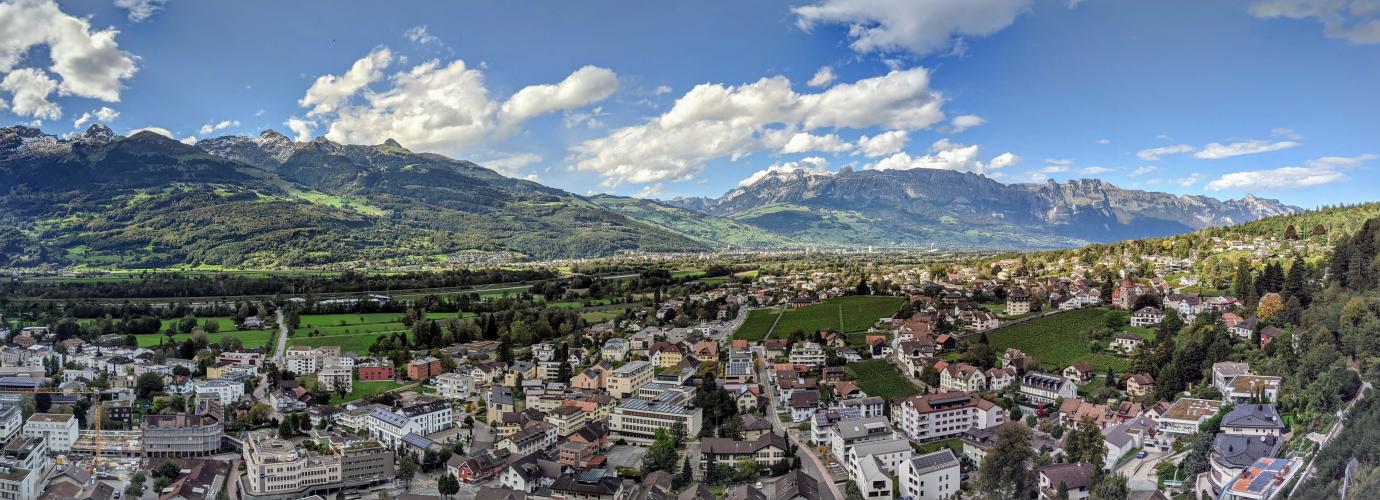“Liechtenstein is a constitutional, hereditary monarchy on a democratic and parliamentary basis; the power of the State is embodied in the Reigning Prince and in the People and shall be exercised under the conditions set forth in the provisions of this Constitution” (Article 2 of the 1921 Constitution).
Governement
The Government is Liechtenstein's ultimate executive body. As a collegial body comprising the Prime Minister and four Ministers, the Government reports to both the Parliament (the ultimate legislative authority) and the Reigning Prince (the head of state). The Government is elected for a period of four years by the Prince based on a recommendation by the Parliament. The seat of the Government is Vaduz, the capital of Liechtenstein. Each of Liechtenstein's two main regions, the Oberland (Upper Country in the south) and the Unterland (Lower Country in the north), has the right to at least two members of Government.
According to the constitution “the way the government is attending to political issues is partly a collegial process and partly a departmental one”. Every member of Government has been assigned certain political fields, the following shows the current assignment of the ministries:
- Ministry for General Government Affairs and Finance
- Ministry for Ministry for Infrastructure and Justice
- Ministry for Social Affairs and Culture
- Ministry of Home Affairs, Economy and Environment
- Ministry of Foreign Affairs, Education and Sport
The departments of economy, justice, sports and culture are allocated to the ministries, resulting in adapted designations of the ministries. The Ministry for Education in the current terms of government is under the supervision of the Ministry for Foreign Affairs, Education and Sport.
The government is committed to a joint government programme. For the years 2021 to 2025, the Government's overarching goal is to jointly shape Liechtenstein in a sustainable and reliable manner. The members of the government share the common understanding that Liechtenstein can only be led into the future with the involvement of all constructive forces.
Prime minister
The Constitution gives the Prime Minister (PM) certain privileges and power. For example, the PM is responsible for all affairs delegated by the Prince and for countersigning laws as well as decrees and edicts issued by the Prince or with his authority. Furthermore, the PM keeps the Reigning Prince informed about government affairs. Only the PM takes an oath of office before the Reigning Prince or the Regnant; the other members of the Government and the state officials are sworn in by the PM. All laws, decrees and sovereign resolutions enter into force or become valid only once they have been signed by the PM.
Parliament
The Parliament or Landtag consists of 25 members (MP). In the State structure of the Principality of Liechtenstein with its dualistic concept, the Parliament or Landtag as the legislative body has the important function of representing all the citizens of the country. As the Liechtenstein State Parliament it is directly elected by the people under a proportional representation electoral system. The election district of the Upper Country elects 15 MPs and the one of the Lower Country 10 MPs. The Landtag is convoked and closed by the Reigning Prince. The Reigning Prince also has the right to dissolve Parliament for important reasons.
The principal task of the Landtag is lawmaking. For a bill to become law, not only is the approval of the Landtag required but also the sanction of the Reigning Prince, the countersignature of the Head of the Government and the announcement in the Legal Gazette. Every law adopted by the Landtag that has not been declared urgent and every international treaty approved by the Parliament may be submitted to a referendum.
Municipalities
The municipalities autonomously arrange and administer their own affairs in their own sphere of influence and under the supervision of the state (Law on the Municipalities of 1996). They implement responsibilities that have been assigned by the state. Political municipal rights include the right to vote, universal suffrage and eligibility, and the right to initiative and referendum.
The municipalities' own sphere of influence includes everything that touches the municipalities' interest and that may be clearly organised and administered by the municipalities. Beyond these activities the municipalities may autonomously carry out further tasks as long as state regulations don't contradict.
Assigned duties include affairs of the state that must be seen to due to legislation. The municipalities are obliged to participate in implementing the law and are provided with the necessary means. Legislation including the participation of the municipalities must clarify the political issues to belong to the municipalities' sphere of influence or to be assigned as duties of the state.
People
The people do not only have the right the elect the Parliament (Landtag), they may in addition enforce the Landtag to convene by way of initiative or dissolve the Parliament by referendum. The right of vote includes the voters' choice to demand a referendum on parliamentary decisions. The Landtag may however declare legislative or constitutional amendments and financial resolutions urgent , a step that does exclude a referendum.
Reigning prince
The Reigning Prince has various options at his hands to influence parliamentary decisions or the Parliament's very existence. Every single law, including the financial resolutions, need to be sanctioned by the Reigning Prince. It is the Reigning Prince's right to convoke the Parliament at the beginning of the year and to close the parliamentary year. Without princely convocation the Landtag has no autonomous right of assembly during the year. Throughout the year the Reigning Prince may dissolve or suspend the Parliament for substantial grounds for a maximum of three months.

